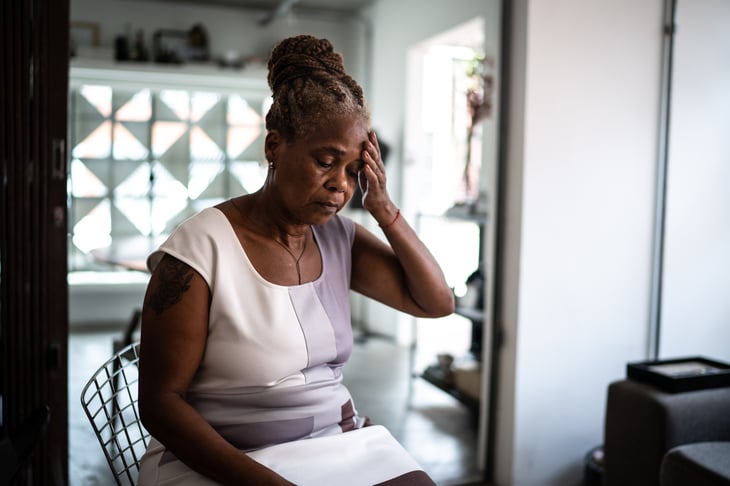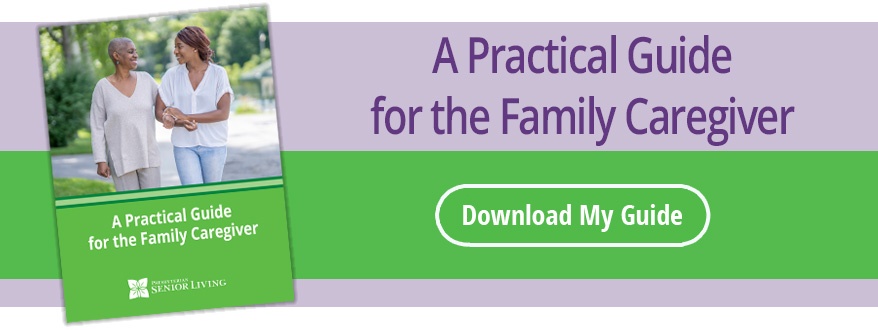
Seven Signs A Senior is Struggling with Self-Care
Updated from the original publication on February 2, 2023.
How do you know when it’s time to begin a conversation about arranging assisted living/personal care for a family member? Did you notice any of these clues when you last visited a loved one?

Rose* was devastated when her husband passed away. Not only had she lost her decades-long companion and friend, but she had also lost her structural pillar.
Her husband had taken care of the finances, made repairs to the house, and ensured that the car was inspected. Her children had moved far away. She found herself very much alone, with the day-to-day demands of life beginning to overwhelm her.
This is the story for so many seniors. How do you know when it’s time to begin thinking about more extensive care?
Douglas Wise, Corporate Director of Referral Development at Presbyterian Senior Living, has walked through senior living communities with hundreds of families, listening to their stories.
“They’re not alone in making this decision in their lives,” he says. “We want to help guide you through this process and help find the best solution for mom and dad and their safety.”
7 Signs a Senior Has Difficulty With Self-Care
Doug recommends that when family members visit a senior, they keep an eye out for clues that indicate that they might not be getting the care needed.
- Expired or excessive food and untouched beverages
Eating alone can be depressing for a senior. Expired food might build up in the fridge. A senior could turn to eat the same simple meal every day. Not drinking enough fluids also is common, and dehydration can wreak havoc on health, Doug says.
- Neglected medical care
Doug encourages caregivers to check a senior’s medicines and pillboxes. If pillbox slots for past days of the week still contain pills, the senior might be forgetting this important part of her routine. Do medication bottles have too many or too few pills for the month? Have you found pills on the floor? With failing eyesight or coordination, pills can be dropped and forgotten, presenting a danger to pets and children. Are doctor appointments being missed or information from those visits forgotten? Neglecting medical care can lead to dangerous results for a senior and problems for those around them.

- Dings and scratches on the car
When your loved one drives, can they do so safely? Are there signs that it might be time for a vision checkup?
- Housekeeping neglect
Are home repairs falling behind? Is the housekeeping being neglected? A lack of basic home maintenance could be a sign that there’s a deeper issue to address.

- Neglected hygiene
Is the senior wearing the same clothes repeatedly? Have they stopped doing their hair, taking care of their fingernails, or bathing? These might be signs that more personal caregiving is required.
- Mail is piled up, bills aren’t paid
Have you noticed stacks of unopened mail throughout the home? Are bill collectors calling?
- Pet care issues
Is the dog or cat bowl always empty? Is the yard full of pet waste? If the senior’s pet isn’t receiving adequate care, it might signal a serious concern.

Taking Early Action
If the clues are mounting, Doug recommends acting early.
Many people wait for a major issue to develop, he says, but once a senior has broken a hip or experienced significant memory issues, their options become much more limited.
Choosing an assisted living or personal care option before a negative life event occurs opens the door for a senior to connect with a community, build relationships, and discover his interests and preferences while he still has the ability to explore.
Approaching the Conversation With Care

The goal of assisted living is to help seniors maintain as much independence as possible while ensuring that safety and self-care concerns are addressed. Surrounded by a community in a space that allows for personal privacy, a senior can choose the lifestyle they want without sacrificing their needs.
Exploring options early also can help protect a parent-child relationship.
“They can be 100 percent a daughter and a son while not worrying about appointments, pills, or if mom or dad is leaving the oven on,” says Doug.
Instead, when a child comes to visit a parent, the time can be spent on making memories and spending quality time together. Family members can rest assured that if the senior’s needs surpass their level of assisted-living care, there will be a plan in hand and a place to go. At Presbyterian Senior Living, if a senior runs out of money, they will not be forced out of her home.
The first step for family members, says Doug, is to share concerns and schedule a visit to a few assisted-living or personal care communities. Consider not just the beauty of a space but the sense of community and culture. Speak with people who live there about how they came to choose that community. Find out when the longest-serving employee started working there.
“If the employees are happy there, you know the residents will be happy there,” Doug says.
After Rose lost her husband, one of her children connected her with a Presbyterian Senior Living community. She began socializing, making friends, and gaining back weight. With her medications regulated, her memory became stronger. She had opportunities to volunteer in the community and the assistance of staff to set up video calls with her family.
She’s thriving.
Stories such as that keep Doug coming to work every day, guiding families through the learning process, and enriching one life at a time.
To hear directly from Doug and other Presbyterian Senior Living residents that benefit from Personal Care/Assisted Living, please watch our latest webinar or to learn more, visit: www.psl.org/more.
*Name changed for privacy
About Presbyterian Senior Living
As the trusted leader in aging services, Presbyterian Senior Living combines over 95 years of experience with innovative approaches to senior communities and services. Across our 27 communities in PA, MD, OH, and DE, we serve over 6,500 seniors. We are committed to: FOSTERING teamwork and responsibility. UPHOLDING integrity in every action. EMBRACING innovation to create opportunities for everyone’s success. LEADING with compassion and respect.


